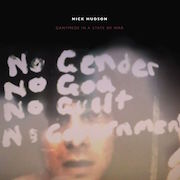Born from the end of a relationship and Hudson’s script for an unproduced allegorical play, Ganymede In A State of War is a multifaceted LP that’s also the conclusion of a five-album cycle collectively known as the Phoenix Archaeologies, which should give some idea of the visionary ambition at work here.
A musician, writer and film-maker, Hudson has been lauded by the likes of Julian Cope and David Tibet and can usually be found performing with a shifting line-up in his band, The Academy of Sun. On Ganymede he produced, programmed and played most of the instruments with the assistance of an international cast of guest players, including guitarist Greg Massi (ex-Kayo Dot), bassist Matthew Seligman (Bowie, Morrissey, Robyn Hitchcock), violinist Lizzy Carey (Bat for Lashes), LA singer Carisa Bianca Mellado and drummer Jareth Tait. The album also opens with a choir of heavenly voices- Canadian queerpunk artist GB Jones and Opera Arcana- chanting "Pump me full of oblivion drugs and float me out to sea", and concludes with a field recording of Hudson’s open-ended acoustic drone collective Platform On The Ocean, resonating hypnotically beneath a Brighton viaduct. Somewhere in between, fifty invited voices cast their own magical spells simultaneously. It’s that kind of an album.
Perhaps surprisingly however, Ganymede is also extremely accessible, direct and melodic. ‘I’m Not Looking For Love,’ the album’s most immediate pop song, combines arch lyrics with swooning vocals and a chorus obvious enough to be sung along to on daytime radio, but skewed enough to keep the outsiders and the attentive interested. A Suede-like, homoerotic windswept ballad, it’s underpinned by tricky jazz rhythms and Patrick O’Brien’s off-kilter, Mike Garson-esque piano flourishes that add to, rather than detract from, the song’s catchiness.
It’s not the only song to display a Bowie influence; Greg Massi plays a Mick Ronson-like guitar foil to Hudson’s wayward crooning throughout, and the fusion of experimental ideas with pop song structures and oblique, occult, subversive or playful lyricism very much follows in the master’s footsteps. The fact that Ganymede is also a vague theatrical concept album is another Bowie-esque conceit, with the record unfolding in three acts. The first four songs detail the aftermath of a relationship and the experience of crawling from the wreckage, leading up to the Bono-baiting ‘The Truth And Three Chords’, which ends on the line "A marriage proposal is only a hex in denial about being a spell."
This takes us into the self-styled "Hate Triptych": three songs written in late 2013 and directed at David Cameron that seem even more relevant in the post-Cameron malaise of the record’s release. These include ‘The Day We Broke In,’ with its opening rallying cry (reproduced on the album’s cover), "No gender, no god, no government, no guilt, no debt." It’s an anthem for existential anarchists and chaos-worshipping, pagan queer assassins, which simultaneously lambasts middle-class hippies who wallow apathetically in a puddle of their own smug enlightenment. Hudson adopts a falsetto vocal over the kind of electronic, experimental R&B The Associates might be making if Billy Mackenzie was still with us, while on the languid bossa nova of ‘Wake In Fire,’ Carisa Bianca Mellado sings further calls to abandon self-centred contemplation in favour of meaningful engagement with the world.
In the third and final act the personal themes of the opening section re-emerge but with a new sense of purpose. ‘Ballad In Jhonn D’ finds Hudson exploring childhood memories of walking around the former estate of Elizabeth I with his grandmother, being told tales of the virgin queen and alchemist John Dee among "kingfishers, owls, deer and skittering larks." The title track meanwhile describes post-break-up sexual reawakening, and quotes from the poem ‘Ganymede’ by Polish composer Karol Szymanowski while musically referencing Prince and TLC with acoustic guitar, programmed beats and further falsetto gasps and groans.
Of course the album closes with a final grand flourish: ‘A Convoluted Man’ is a widescreen waltz enlivened once again by Greg Massi’s guitar fireworks and a George Harrison-like glam descend, before the song hits a faux-orchestral climax that fuses the romantic sweep of late-sixties Scott Walker with the forward-looking visions of his post Tilt work. "I’m a consummate avant-gardener," Hudson proclaims, "I’m the hangman and the pardoner." If it weren’t for what had gone before this would seem like hubris, and one suspects it is said somewhat tongue-in-cheek. Nevertheless, Ganymede remains a song-suite of liberation, violence and ambition that is rich in promise and dizzying in its potential.


